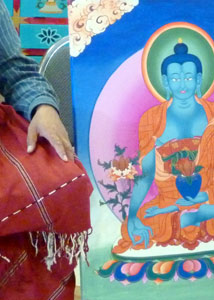Name: Dra Kyam
(Alias: Yes)
Gender: Male
Interview Age: 44
Date of Birth: 1969
Birthplace: Utsang, Tibet
Year Left Tibet: N/A
Profession: N/A
Monk/Nun: Previously
Political Prisoner: No

Interview No.: 21C
Date: 2014-08-03
Language: English
Location: Santa Fe, New Mexico, United States
Categories: Culture and History
Keywords: Cultural Revolution, customs/traditions, monasteries -- destruction of , monastic life, religious art, Utsang
Summary:
Dra Kyam was born into a small farming family in Utsang Province. His father had formerly been a monk who was forced, as most monks were, by the Chinese to leave his monastery. Dra Kyam was the youngest of three children and attended his village school. His father tried to instill Buddhist values into his children without being able to practice Buddhism formally. Later Dra Kyam was enrolled in a monastery and learned to make thangka 'traditional Tibetan Buddhist paintings' from a master in Kham.
Dra Kyam explains how during the Cultural Revolution there was widespread destruction of monasteries and desecration of statues and thangka. He expresses sadness that the remnants of very old paintings are not being properly restored and instead are destroyed and replaced by new artwork. He also expresses disappointment that the art of thangka painting is not being preserved in it's true traditional format and many "fake" versions are now being created by amateurs.
Dra Kyam shares great detail of the art of thangka painting. He describes his own experience from learning to draw to the intricate method of mixing colors and creating different shades. He shares his experience of studying and working in Italy and the United States to gain more knowledge about art in general and learn how to perform restorations on paintings.
Interview Team:
- Marcella Adamski (Interviewer)
- Tomas Haywood (Videographer)
- Tashi Juchungtsan (Interpreter)

